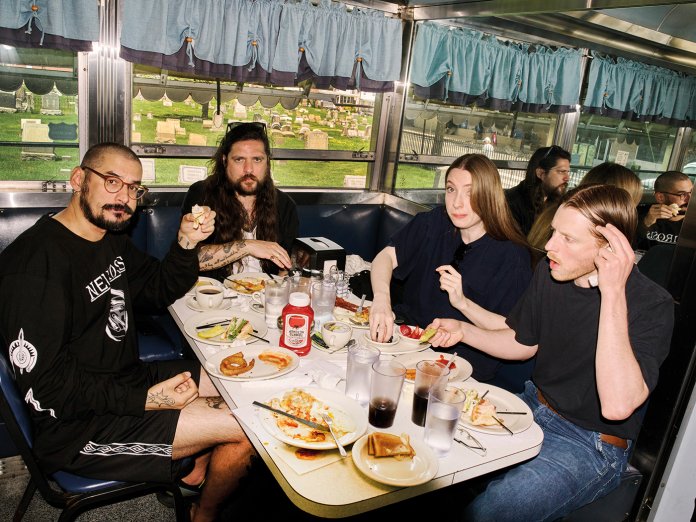If you’ve turned on BBC 6Music in the last few years, you’ll have probably heard a lot of talking; not the DJs, but rather the prevailing tide of sprechgesang in modern indie. Arguably starting with The Fall and The Flying Lizards, it was carried on by Pulp, Earl Brutus, Life Without Buildings and then The Streets, and is now flooding our airwaves. It comes in many forms: there are the modern pioneers like Sleaford Mods and Courtney Barnett, the cartoony post-punk of IDLES and Yard Act, the infectious Wet Leg and Self Esteem, the peerless Fontaines D.C. and Black Country, New Road.
London’s Dry Cleaning are also in that clan, but their releases so far – a handful of EPs and last year’s New Long Leg LP – have presented a group that’s fully formed and strikingly unique. Musically, they flit impressively between Sabbath riffs, Smiths sophistication and dreampop haziness, with Tom Dowse’s guitar usually soaked in chorus and phaser, Lewis Maynard’s bass playing chunky chords and riffs, and drummer Nick Buxton alternately powering and atmospheric.
Above all this, though – metaphorically, but also in the mix – is Florence Shaw, her delivery as casual as a conversation in a coffee shop, the mundanity of her collaged words adding up to something strangely moving, sometimes sad and often hilarious. “Someone pissed on my leg in the big Sainsbury’s”, goes one line on New Long Leg’s “John Wick”, while the same song also details what went wrong with the Antiques Roadshow’s recent revamp. “The reason the price reveals were so good,” she says, doubletracked, “is because we had to wait for them”.
After recording New Long Leg with John Parish at Rockfield, they’ve returned to the same producer and studio for Stumpwork. It’s one of those second albums that document a group exploding out in all directions: they get shorter, snappier and more melodic on some songs, longer and weirder on others.
“Don’t Press Me” appeared first, a sub-two-minute burst of jangling post-punk, Shaw imploring a “rat” not to touch her “gaming mouse”. Its chorus, for once, is sung, and though it’s perhaps the catchiest Dry Cleaning moment so far, it only appears once in the song. Similarly, “Gary Ashby” features singing, but is hooked around Shaw’s usual spoken words. She tends towards the abstract and the obtuse, but here she tells a more straightforward tale of a lost tortoise, the titular Gary: “We gave you our family name / In the lockdown you escaped”. It’s not autobiographical, but the details are silly and poignant in the way real life often is: “Have you seen Gary? / With his tinfoil ball/He used to love to kick it with his stumpy legs”. “Kwenchy Kups” is another up-tempo highlight, suffused with Marr lushness and a killer opening line: “Things are shit, but they’re gonna be OK…”
Elsewhere, Dry Cleaning stretch out and embrace dubby space, improvisation and synths. Oozing five-minute opener “Anna Calls From The Arctic” begins with a positive “shall I propose friendship?” over two constantly cycling keyboard chords and saxophone, and then moves on to the North Pole: “It’s either scientists / Or people who are mining / Or dog sledge people”. Within Shaw’s seemingly disjointed, absurdist text, however, more meaningful contrasts emerge, such as these lines, perfectly encapsulating the UK in 2022: “Nothing works / Everything’s expensive / And opaque and privatised / My shoe organising thing arrived / Thank God”.
Musically, there are similarly brave juxtapositions. “Conservative Hell” mixes jazzy drums with shoegaze guitars, before it falls apart for a hauntological second half complete with feedbacking delay and sax, while “Liberty Log” is seven minutes of unhinged baggy, its funky Mondays drums strafed by Fripp-style guitar drones. “Weird premise”, repeats Shaw, as if she’s commenting directly on the music.
If the music and lyrics are both impressive, though, it’s the interaction between them that makes Stumpwork such a triumph. They work together and against each other, pushing and pulling, fighting arrhythmically or slipping into step as the moment demands. The words feel organic, delivered as if they’re being read out of a notebook, or relayed straight from a train, pub or doctor’s surgery – “I’m not here to provide blank / They can fucking provide blank… Are these exposed wires all good, near the steam?” goes “Hot Penny Day” – but this air of effortlessness is the kind that requires a great deal of work and intuition.
While Stumpwork’s divisive artwork betrays their art-school and illustration backgrounds, in many ways the music does too, enriched with the humour and playfulness of Pulp, Blur or Roxy Music, all groups not afraid to dabble with a bit of spoken word. Here, Dry Cleaning have struck out on their own, combining the mess of the everyday – male violence, gym shorts, broken Kindles, Costa cups, good weddings and bad weddings – into something deep, funny and eventually profound. Everybody’s talking, but nobody’s saying anything quite like this.


